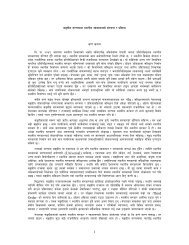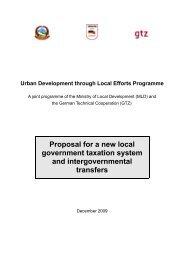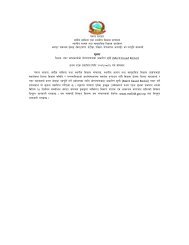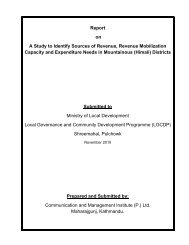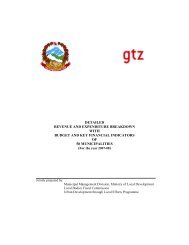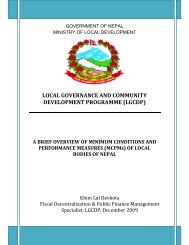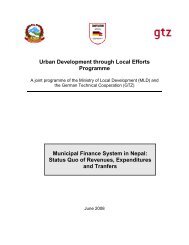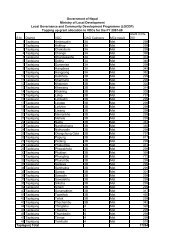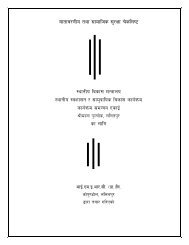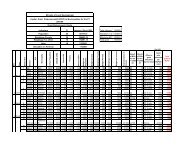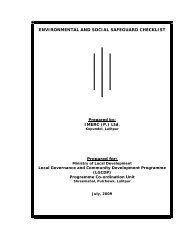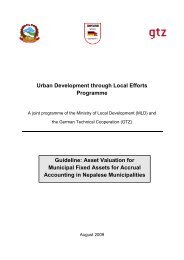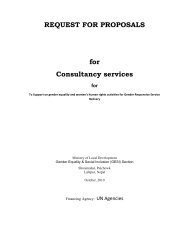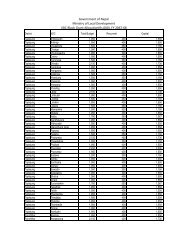GTZ Report on Accrual Accounting Status Quo - LGCDP
GTZ Report on Accrual Accounting Status Quo - LGCDP
GTZ Report on Accrual Accounting Status Quo - LGCDP
You also want an ePaper? Increase the reach of your titles
YUMPU automatically turns print PDFs into web optimized ePapers that Google loves.
Cash <strong>Accounting</strong> vs. <strong>Accrual</strong> <strong>Accounting</strong> 3<br />
when they occur rather when m<strong>on</strong>ey is actually exchanged. This effectively addresses the time difference between the<br />
receipt and payment of goods and also makes future strategic planning and multiple years planning possible. For<br />
example an accountant knows that in the fiscal year of 2008/2009 a certain total amount of tax is to be received even<br />
though it is not yet paid by the tax payer. As a result the accountant would be able to track down the reas<strong>on</strong> for arrears.<br />
Transacti<strong>on</strong>s always affect two accounts in the accrual based accounting, the credits and debits side, which always<br />
have to be matched and balanced. Therefore it is possible to show the source and applicati<strong>on</strong> of funds which makes an<br />
allocati<strong>on</strong> of resources according to specific cost centres possible. For example a cost centre can be created for a bus<br />
park by showing the revenues but also the matched expenses (e.g. operati<strong>on</strong>al and maintenance cost) of the bus park.<br />
This would make the calculati<strong>on</strong> of product costs possible. For example <strong>on</strong>e could calculate an appropriate bus ticket<br />
fee in order to cover all the expenses of the bus park. However, cost centres can also be established for individuals<br />
(e.g. in tax management), projects, departments and so <strong>on</strong>.<br />
The c<strong>on</strong>necti<strong>on</strong> of the source and applicati<strong>on</strong> of funds also makes performance based budgeting, reporting, auditing<br />
and in general outcome orientati<strong>on</strong> possible since <strong>on</strong>e knows the crucial linkage between what was invested by whom<br />
to achieve a certain outcome. For this reas<strong>on</strong> accrual accounting has the potential to change the steering tools <strong>on</strong><br />
which cash accounting is based <strong>on</strong> towards performance and outcome orientati<strong>on</strong>. For example accrual accounting<br />
provides a mayor or executive officer with much more financial informati<strong>on</strong> which enables him to optimize the<br />
budgeting process.<br />
Another major characteristic of accrual accounting is the usage of depreciati<strong>on</strong>s and/or reserve allocati<strong>on</strong> in order to<br />
reflect the wear and tear of assets and future resource c<strong>on</strong>sumpti<strong>on</strong>. Depreciati<strong>on</strong>s are bookings, used to artificially<br />
display the real happening devaluati<strong>on</strong> of e.g. a street through usage. Reserve allocati<strong>on</strong> is a c<strong>on</strong>nected tool to reserve<br />
m<strong>on</strong>ey for maintenance or reinvestment in order to address this devaluati<strong>on</strong>. Through the income statement, where<br />
total revenues are matched to expenses, the net resource c<strong>on</strong>sumpti<strong>on</strong> of e.g. a municipality is being displayed. The<br />
income statement together with the balance statement of financial positi<strong>on</strong> displays the profit or deficit of a financial<br />
period.<br />
<strong>Accrual</strong> based accounting is the dominant private sector accounting system.<br />
Overview 1: Cash <strong>Accounting</strong> vs. <strong>Accrual</strong> <strong>Accounting</strong> (Broader Overview available under<br />
Athukorala & Reid, 2003, p.26-27)<br />
Cash <strong>Accounting</strong><br />
<strong>Accrual</strong> <strong>Accounting</strong><br />
Full knowledge of all payment flows Only cash transacti<strong>on</strong>s<br />
Complete financial overview possible<br />
Time of booking<br />
Recognizes transacti<strong>on</strong>s and ec<strong>on</strong>omic Recognizes transacti<strong>on</strong>s and ec<strong>on</strong>omic<br />
events <strong>on</strong>ly when cash is received or paid events when they occur<br />
Management of Assets and<br />
Resources<br />
No single accounts for assets and<br />
resources<br />
Full knowledge <strong>on</strong> the value of<br />
resources and assets



